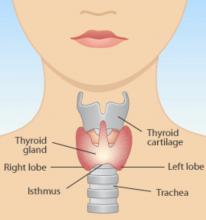
The thyroid gland is fundamental to the functioning of several organs such as kidneys, liver, brain, heart and even skin. Dr Shital Patel explains the common types and causes of thyroid disorders.
The thyroid is a butterfly-shaped gland at the lower-front part of the neck, just below the Adam’s apple. It is an endocrine gland made up of two lobes connected by a isthmus.
It is responsible for the secretion of thyroid hormones which regulates body processes such as respiration, body temperature, pulsation, digestion and almost all the metabolic processes in your body.

Thyroid disorders can be due to goiters (enlarged bulge in the gland usually due to iodine deficiency or autoimmune disease) to chronic conditions like Graves' to thyroid cancers!
The thyroid gland produces two major hormones:
1) Thyroxine (T4). It contains four atoms of iodine.
2) Tri-iodothyronine (T3) It contains three atoms of iodine.
Thyroid function tests(TFT) are a series of blood tests used to measure how well your thyroid gland is working. Available tests include the T3, T4, TSH, TSI and TPO.
Thyroid Stimulating Hormone (TSH) - The amount of T4 produced by the thyroid gland is controlled by another hormone, which is made in the pituitary gland located at the base of the brain, called thyroid stimulating hormone.
T4 and TSH Tests
The T4 test and the TSH test are the two most common thyroid function tests. They’re usually ordered together.
Hyperthyroidism - If the TSH level is low and the FT4 result is high this suggests an over-active thyroid (hyperthyroidism) that requires treatment. Learn more about Hyperthyroidism here.
Hypothyroidism - If the TSH level is high and the FT4 (free T4 in the blood) result is low this suggests an under-active thyroid (hypothyroidism) that requires treatment. Learn more about Hypothyroidism here.
T3 Test
The T3 test checks for levels of the hormone tri-iodothyronine. It’s usually ordered if T4 tests and TSH tests suggest hyperthyroidism. The T3 test may also be ordered if you’re showing signs of an overactive thyroid gland.
TSI Test
TSI stands for thyroid stimulating immunoglobulin. TSIs are antibodies that tell the thyroid gland to become more active and release excess amounts of thyroid hormone into the blood. A TSI test measures the amount of thyroid stimulating immunoglobulin in your blood. Thyroid stimulating immunoglobulins are usually indicative of Grave’s disease. This is an essential test for all pregnant mothers to check for elevated levels.
TPO Test
Testing for thyroid antibodies, such as thyroid peroxidase antibody (TPO), is primarily ordered to help diagnose an autoimmune thyroid disease like Hashimoto’s disease or thyroiditis (chronic inflammation of the thyroid) and to distinguish it from other forms of thyroid dysfunction. The thyroid peroxidase is the enzyme that helps convert T4 to T3.
Iodine Uptake Scan
A means of measuring thyroid function is to measure how much iodine is taken up by the thyroid gland. Cells of the thyroid normally absorb iodine from our blood stream (obtained from foods we eat) and use it to make thyroid hormone. Hypothyroid patients usually take up too little iodine and hyperthyroid patients take up too much iodine.
Thyroid Antibodies
The body normally produces antibodies to foreign substances such as bacteria; however, some people are found to have antibodies against their own thyroid tissue. A condition known as Hashimoto's Thyroiditis is associated with a high level of these thyroid antibodies in the blood.
Causes of Hyperthyroidism
Hyperthyroidism means an overactive thyroid gland. When your thyroid gland is overactive it makes too much thyroxine. The extra thyroxine causes many of your body's functions to speed up.
The three most common reasons for this are:
- Graves' disease: Graves' disease is the most common cause of hyperthyroidism.
- Thyroid tumor: A noncancerous thyroid tumor may make and secrete increased amounts of thyroid hormones.
- Toxic multinodular goiter: The thyroid gland is enlarged with many noncancerous thyroid tumors.
Other causes are
- Factitious hyperthyroidism (taking too much thyroid hormone medicine or supplements)
- Iodine overload
- Subacute thyroiditis (swelling or inflammation of the thyroid gland)
- Silent (or painless) thyroiditis.
- Amiodarone (medicine to treat some kinds of heart disease)
During Pregnancy
Gestational transient hyperthyroidism is often associated with hyperemesis gravidarum, which is a relatively uncommon condition in women during the first and second trimester of pregnancy. It is a transient phenomenon which resolves itself by the 20th gestational week.
Causes of Hypothyroidism
In contrast, if you have hypothyroidism, you make too little thyroxine; this causes many of the body's functions to slow down. Hypothyroidism results when the thyroid gland fails to produce enough hormones. Those who suffer from hypothyroidism often feel tired, tend to sleep a lot, experience constipation and stubborn weight gain. Hypothyroidism may be due to a number of factors:
Most common cause:
Hashimoto's thyroiditis - This inflammatory disorder, which is an auto-immune condition is the most common cause of hypothyroidism
Other causes:
Congenital disease - Some babies are born with a defective thyroid gland or no thyroid gland. In most cases, the thyroid gland didn't develop normally for unknown reasons, but some children have an inherited form of the disorder. Often, infants with congenital hypothyroidism appear normal at birth. That's one reason why most states now require newborn thyroid screening.
Pituitary disorder - A relatively rare cause of hypothyroidism is the failure of the pituitary gland to produce enough thyroid-stimulating hormone (TSH) — usually because of a benign tumor of the pituitary gland.
Pregnancy - Some women develop hypothyroidism during or after pregnancy (postpartum hypothyroidism), often because they produce antibodies to their own thyroid gland. Left untreated, hypothyroidism increases the risk of miscarriage, premature delivery and preeclampsia — a condition that causes a significant rise in a woman's blood pressure during the last three months of pregnancy. It can also seriously affect the developing foetus.
Iodine deficiency - The trace mineral iodine — found primarily in seafood, seaweed, plants grown in iodine-rich soil and iodized salt — is essential for the production of thyroid hormones. In some parts of the world, iodine deficiency is common, but the addition of iodine to table salt has virtually eliminated this problem in the United States. Conversely, taking in too much iodine can cause hypothyroidism.
Neonatal screening for congenital hypothyroidism
World wide data shows that around 1 out of 3000 newborns are affected with hypothyroidism, hence screening at birth is essential. Screening is performed between days 2 and 4 of birth. Babies who are born preterm or with low birth weight or under critical conditions are at a higher risk. Most countries around the world have a standard screening protocol for newborns with a heel prick blood sample. Screening strategies include measurements of TSH and T4 levels. Maternal tests are also done to confirm any placental transfer of auto-antibodies.
Related reading: Very low rate of Thyroid Disorder screening during Pregnancy







